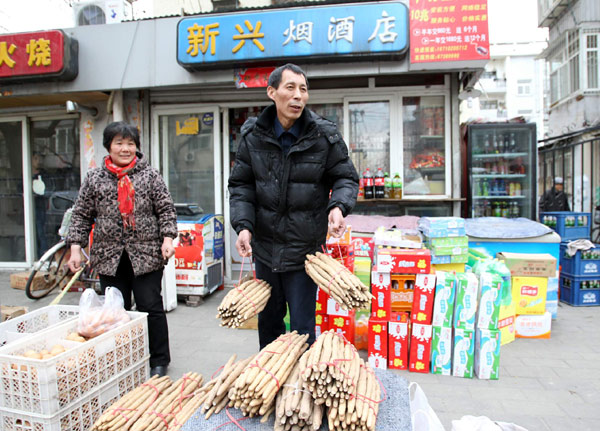Good Samaritan
Updated: 2013-04-03 05:32
By Deng Zhangyu (China Daily)
|
|||||||||||
|
 Yang Xinxing and his wife Yang Cailing have sold daily necessities at Shuiduizi community in Beijing for decades. Zhang Wei / China Daily |
While essential items were scarce during the SARS period, there was one kind grocer who instead of taking advantage of the situation, continued selling his goods at unchanged prices. Deng Zhangyu tells his story.
Editor's Note: Ten years ago, the world was hit by the Severe Acute Respiratory Syndrome (SARS) epidemic. Thousands lost their lives, including medical workers all over the world who selflessly looked after patients in spite of the high risks of infection. The effects of the dreaded virus still reverberate to this day. In a series of reports, China Daily highlights the human faces behind the news.
Daily necessities became rare finds when SARS gripped Beijing in April 2003. But community grocer Yang Xinxing stabilized prices and consequently eased locals' fears by providing goods at unchanged prices.
Eggs, for instance, cost 1.7 yuan (27 US cents) at Yang's store compared to 3.5 yuan at the place across the street, recalls Liu Jingxia, who has worked at the neighborhood committee for decades.
Rumors suggested Beijing would be cut off from other cities, as the infection toll and number of sacked officials increased. This generated fears of shortages.
Yang, the grocer in eastern Beijing's Shuiduizi community, posted a sign early on April 23 that read: "Beijing's food supply is sufficient. Rice, oil and eggs at my grocery will be sold at the usual price."
His store's stock - 500 kg of eggs and 1,500 kg of rice - sold out two hours later.
Yang had made the purchases at 2 am from a wholesale market.
The market was crowded with trucks waiting to load supplies until midnight.
"I'd feel guilty and condemned by my conscience if I had raised the price," Yang says.

"Residents have helped me a lot since I came here decades ago," the 54-year-old says.
So, Yang kept prices low, even as wholesalers jacked them up. When rice increased from 1.2 yuan to 1.4 yuan, Yang still sold rice for 1.2 yuan.
His wife, Yang Cailing, recalls: "There were so many shoppers that we ran out of hands to collect the cash. I even gave the wrong change."
She recalls many outsiders came by bus.
The second day, Yang Xinxing posted another sign that read: "Please wait a day or two, and prices will return to normal."
He'd found prices to be stable after visiting several wholesale markets.
Food costs returned to normal three days later, thanks to government intervention.
Yang lost 3,000 yuan in those three days. He usually supported his family of four on about 2,000 yuan a month.
"I promised I wouldn't raise prices when I posted the sign," he recalls.
"I had to keep my word, no matter what I lost."
Yang comes from a village in Henan province. Poverty forced him to drop out after primary school. He joined the navy at age 20 for three years.
Yang moved to Beijing's Shuiduizi in 1986. He struggled to make a living as a construction worker, carpenter and street vendor. He opened his grocery in 1991.
"We could settle here because community members have helped us a lot," Yang says.
Yang and his family lived in a 7-square-meter room temporarily built next to his store.
Yang's family was so poor that they "had no pot to cook".
Community residents often gave them things they needed.
Neighborhood committee member Liu Jingxia says: "Yang is always willing to help others. Everyone here knows him."
Yang delivers goods people order, even though he must sometimes haul a crate of beer to the sixth floor, Liu explains.
Yang's business card reads: "Call me whenever you need something."
Yang got a midnight call for help from an elderly man who lived alone and needed urgent hospital care. Yang took him for treatment and stayed with him until his family arrived.
"Residents here think highly of him," says 77-year-old Cui Keliang, who has lived in the community for 50 years.
"Every year, he brings me free medicinal herbs from his hometown. If I call him, he delivers things to my house no matter how heavy they are."
Cui says Yang has provided free goods, including eggs, milk, rice and oil, to needy families in the community for many years. He also donates money to orphanages and people in need.
Liu says: "I really admire him. If he saved all his donated money, he could have bought a house in Beijing. But he donated everything instead."
Yang, his wife, his son and his daughter-in-law live in a rented house that's about 20 square meters. The grocery is fewer than 10 square meters.
"Many of my friends think I'm silly for helping people without asking for repayment," Yang says, sitting on the bed that occupies half his room.
"But I feel really happy when I do things for people."
His wife, who's sitting next to him, says: "He is silly. But I support his every decision."
Yang's grocery faces demolition in the future. "I hope I can find a new place to run my grocery and run it with a special brand of me - that is, always helping people in need," he says.
Yang has added his son's name and phone number to his business card. He says he expects his son will inherit the spirit of goodwill.
Contact the writer at dengzhangyu@chinadaily.com.cn.
(China Daily 04/03/2013 page20)
Today's Top News
Police continue manhunt for 2nd bombing suspect
H7N9 flu transmission studied
8% growth predicted for Q2
Nuke reactor gets foreign contract
First couple on Time's list of most influential
'Green' awareness levels drop in Beijing
Palace Museum spruces up
Trading channels 'need to broaden'
Hot Topics
Lunar probe , China growth forecasts, Emission rules get tougher, China seen through 'colored lens', International board,
Editor's Picks

|

|

|

|

|

|





